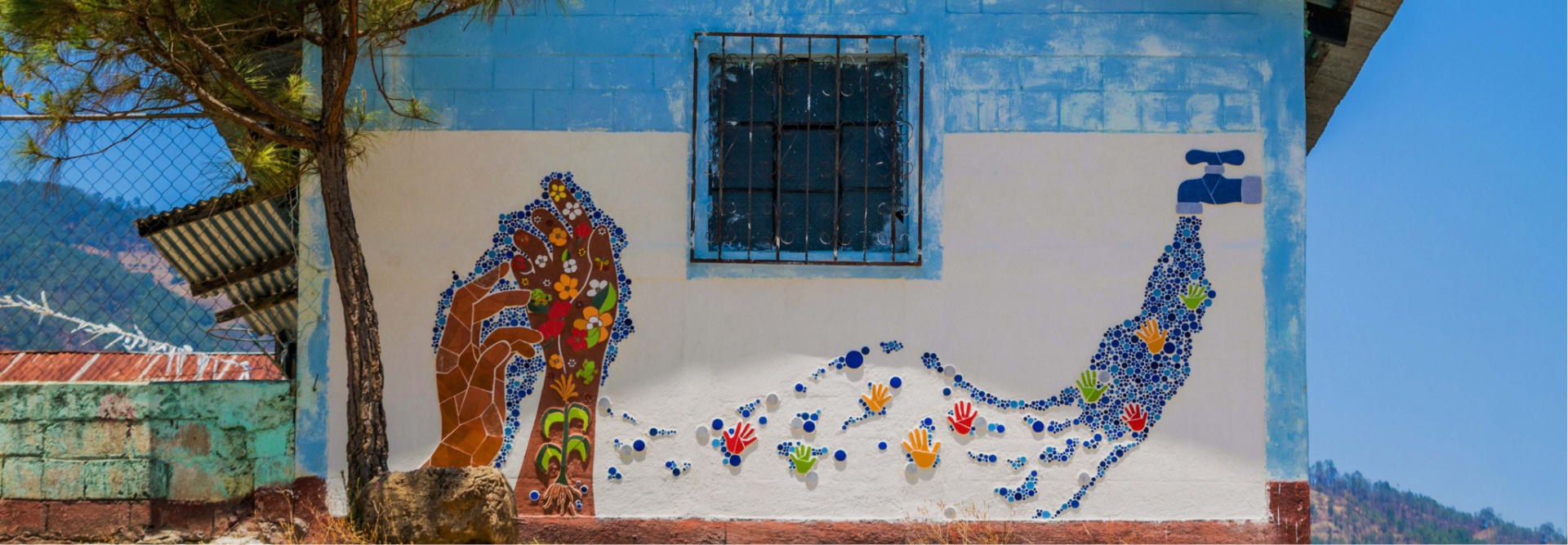Enhancing Handwashing with Social Art for Behaviour Change

Update : October 2021
The COVID-19 pandemic has reminded us that global health is only as strong as its weakest link. Handwashing with soap remains the most simple and powerful hygiene practice to curb the spread of viruses such as the one causing COVID-19 and many other infectious and parasitic diseases that weaken or kill millions of people around the world every year (1) (2). Although the solution seems basic, the alarming reality is that 40% of the world’s population cannot wash their hands with soap at home, and critical settings such as health care facilities (at least 16%) and schools (44%) around the world lack basic handwashing services (3) (4) (5).
Handwashing infrastructure alone, however, will not deliver the many health and associated social and economic benefits of handwashing. This is because handwashing with soap is rarely practiced as often as it needs to be, even when water and soap are accessible. As expressed by the Global Handwashing Partnership, behaviour change efforts are critical to ensure handwashing with soap becomes a habit within populations (6). This is precisely the focus of One Drop’s work with our partners: promoting hygiene behaviour change, thanks to our Social Art for Behaviour ChangeTM (SABC) approach, which complements the building of infrastructure, strengthening the enabling environment, and ensuring a supply of vital products and services1.
SABC is One Drop’s unique approach to changing behaviours regarding water, sanitation and hygiene, including handwashing. Applied in collaboration with artists and the participation of members of beneficiary communities, our approach creates locally inspired behaviour change programs. It does so by integrating cultural and artistic references and an understanding of the local barriers and drivers for engaging in a behaviour. With SABC at its heart, our A·B·C for Sustainability™ model delivers a powerful systemic approach to ensuring that handwashing infrastructure is built, used, and sustained.
In Guanajuato Mexico, our partner Living Water International collaborates closely with local artists to create behaviour change programming in rural communities where the Mexican government has built water systems that now directly supply the households of more than 53,252 people. The SABC process is comprehensive and based on the lived realities of the communities we work in.
Before implementation, a rigorous formative research process is used to reveal the profile of the target groups that should be the focus of the intervention and the factors that influence whether these groups engage or not in handwashing with soap. Once the barriers and drivers that influence its practice have been defined, the artists start ideating and testing SABC interventions, including local folklore and art techniques, alongside target group members from the community. One Drop provides technical support to the partner throughout this process, as well as during the project design and implementation.
The resulting SABC interventions are diverse and all have something in common: they are artistic, participatory, and aim at promoting handwashing with soap, based on the cultural and behavioural realities of the communities we work in. Some have taken the form of theatre forums meant to inspire the community at large through theatre, followed by a discussion where a commitment to a concrete solution is expressed by attendees. Others are filmmaking workshops where the participants, guided by the artists, create short films about handwashing that they then present to other members of their communities to replicate the message. In Guanajuato Mexico, SABC interventions implemented thus far, along with the water services’ improvement efforts by the government, have resulted in handwashing with soap at key moments to be more common among the population living in target communities (about 62,500 people) going from 26% at baseline to 50% halfway into the project, about a year and a half later.
Like the Guanajuato project, One Drop supports the implementation of the SABC approach for handwashing in 16 other projects across the world, including in schools and health care settings. Making hand hygiene accessible by providing water and soap is not enough; behaviour change promotion needs to complement efforts for increasing basic hygiene coverage.
Promoting handwashing in vulnerable communities through Social Art for Behaviour Change allows these communities to better confront a health crisis such as the one we are currently facing. And beyond health, good hygiene removes barriers to education, nutrition, economic opportunity, and equity (6).
October 15 is Global Handwashing Day. Now and for the future, let's continue to promote handwashing for all. Let’s continue to do so with creative, innovative, and sustainable approaches based on the needs and realities of communities worldwide.
Together, let's continue to turn water into action.
1.Social Art for Behaviour Change is a trademark owned by One Drop Foundation.

REFERENCES
1. World Health Organization. Global report on the epidemiology and burden of sepsis: current evidence, identifying gaps and future directions. Geneva: World Health Organization, 2020. CC BY-NC-SA 3.0 IGO.
2. Prüss-Üstün, Annette, Wolf, J., Corvalán, Carlos F., Bos, R. & Neira, Maria Purificación. Preventing disease through healthy environments: a global assessment of the burden of disease from environmental risks. s.l.: World Health Organization, 2016. 9789241565196.
3. WHO, UNICEF, Joint Monitoring Programme. washdata.org [Online] 2017. [Cited: 09 20, 2020.]
4. World Health Organization and the United Nations Children’s Fund. WASH in health care facilities: Global Baseline Report 2019. Geneva: WHO and UNICEF, 2019. CC BY-NC-SA 3.0 IGO.
5. World Health Organization and United Nations Children’s Fund. Progress on drinking water, sanitation and hygiene in schools: Special focus on COVID-19. New York: WHO and UNICEF, 2020. 978-92-806-5142-3.
6. Global Handwashing Partnership. globalhandwashing.org [Online] 09 2017. [Cited: 09 20, 2020.]
